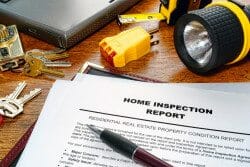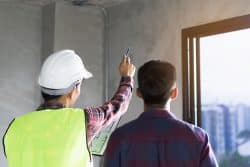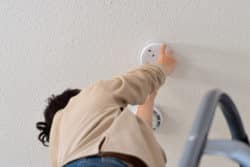5 Risks In Using Past or Prior Home Inspection Reports
Home » Inspections »
As a home buyer, there are serious risks in using or relying on an old, past or prior home inspection report for numerous reasons, including the fact that all inspectors and reports are not the same and that there are legal concerns as well; therefore, it’s important to know what the risks are, even if the past report is only a week old.

Occasionally, buyers are provided with a past or prior home inspection report from a previous deal that fell apart. The deal may have fell apart for numerous reasons; the buyer was unable to get a loan, loss of job or the buyer decided that he or she just didn’t want the home anymore.
As a current buyer, it is important to know that there can be big differences between home inspection reports and that they’re not the same in many ways; thus there are inherent risks in using a prior or past home inspection report.

Why are there big differences in home inspection reports
The inspector – just how good was the inspector who did the prior inspection report?
Home inspectors are like golfers, there are some good ones, and there are some really bad ones. A home inspector may have a background in construction or was a contractor, or he may have been in a different occupation, perhaps a teacher, waiter or an athlete. The number of years of experience as an inspector will differ, perhaps they’re in the first month or have years of experience, some are certified inspectors by a professional organization, others are not. About 60% of the states require an inspector to pass a basic examine to obtain a license and most professional organization will have minimum requirements and a requirement for some form of continuing education each year, but there are no four year educational or degree requirements.
Not all states require a home inspector to be licensed. Roughly 40% of all the states do not require a home inspector to be licensed by the state; i.e. California does not require one. Therefore, there is not even a minimum requirement in 40% of the states that a home inspector must met. ( Read – How to pick a good inspector)

The scope of work, the standards of practice
One of the most important things that a buyer should know is just what will the inspector check or look for. Are there exclusions and limitations? In some states, the state establishes a minimum set of things that a home inspector will be required to inspect and report on. In addition to these minimum requirements there may be limitations and exclusions in the contract between the previous buyer and his inspector that you are not aware of. Not seeing this contract, there is no way of knowing what was agreed to that will affect the report.
The bottom line is that a buyer should know what the scope of work and the standards of practices are that the home inspector used in writing his report. Additionally, a buyer who hires a home inspector should read the scope of work and standards of practices that the inspector uses when doing your home inspection. You may be surprised by the limitations.
There is a risk that something has changed since the last inspection was done
There is always a risk that something bad has happened since the last inspection was performed, however this is unlikely if the past inspection is only a week or two old. Naturally the older the report the higher the possibility.
Leaks in an attic or under the home or slab aren’t always apparent right away and even the sellers may not be aware of them. Perhaps a breaker has over heated and started to slowly melt, but hasn’t tripped yet, it unlikely that the seller or anyone would know unless there was a current inspection.

If there has been a past home inspection report, should you request a copy?
The short answer is yes. The more information that you have about the condition of the home, the wiser decision you can make about whether to purchase the home.
Ask the seller and the listing agent, “Has there been a previous home inspection?”
If the answer is yes, then request a copy of the report. Note that in some states the seller or listing agent may not be able to provide you with a copy because of state law or the terms of the contract. However, even if they can not provide you with a written copy of the report, there may be a number of items in the report that they have a legal duty to disclose to you.
Making your request in writing is wise, as well as asking the seller and listing agent of the home, in writing, if they can’t provide you with a written copy, what issues or facts were in the report that would affect the value or desirability of the home. This may entice them to review the report to see what needs to be disclosed to you that they had not thought of.
The majority of agents want you to be aware of any problems or issues with a home and are more than willing to help you.
Are there any other types of inspection or reports done on the home?
Sellers may have had other types of inspections or investigations performed on their home that might be of importance to you in doing your due diligence in the purchase process.
Examples of other types of inspections would be:
- A pest / termite inspection
- Pool or spa inspection
- Fireplace inspection
- Radon inspection
- Mold inspection
- Structural engineers’ inspection
- Geotechnical inspection
- Roof, plumbing or electrical inspection
If there has been any previous inspections or investigations, then having a copy of them would provide you more information about the homes condition; therefore, requesting a copy of them would be wise.
Presale or listing inspection reports – was there one?
There are some sellers who do a pre-sale or listing inspection so that they can fix things before they come up on a buyer’s home inspection. Asking if there has been one and requesting a copy, if there has been one will also help add to your information about the condition of the house. (Read about Presale home inspections )

Legal considerations
If a prior home inspection was done, most of the time it was paid for by the buyer and the report is basically the buyers’ property. Secondly, there was probably a written contract between the home inspector and the buyer that spells out terms of the inspection and scope of work. In these types of contracts, it is not unusual for there to be legal language about who the report belongs to and it may even state the report is copyrighted or that it can not be shared or given to other parties. If the seller or agent did so, they might be in violation of the contract. ( NOTE: It is recommended that any legal questions be discussed with an attorney – this article is not and should not be considered legal advice)
Since a new buyer does not have a legal contract with the prior home inspector who wrote the prior report, there may not be any legal recourse against an inspector who missed or failed to report on a significant defect or problem that should have been reported on. Through having your own inspector and contract with that inspector, you may have significantly more legal rights regarding the report. In general, both you and the inspector are better protected.

Not having the advantage of walking around the home with the inspector, seeing the issues and asking the inspector direct questions
At a home inspection the inspector will generally allow you to go around the home with him as he does the inspection or at the end of his inspection sit down with you and go over what he discovered and if you have questions about a specific issue, then he may actually show the issue personally.
Being able to actually see what the inspector is talking about or asking questions right on the spot is something that you can not do if you just rely on a prior report.
If a prior inspection report missed something and you don’t have your own inspector who discovers it; you may have lost the opportunity to negotiate the price or have it fixed by the seller
Not discovering a defect or problem within the time specified in a purchase agreement for to do your own due diligence, may nullify your opportunity to come back later and ask that it be fixed or negotiate a credit or reduced price. Failing to obtain your own home inspector and only relying on someone else’s past inspection report is risky; especially when the prior inspection report did not list the defect and you are not aware of it.
- Having a copy of a past inspection report is a good thing for it may bring to light additional information about defects or issues about a house; however, it’s not a substitute for having your own inspection and inspector.
- All home inspectors are not the same; there are big differences in knowledge, experience and skills.
- It is wise to ask the seller and listing agent if there are any past home inspection reports and if so, to ask for a copy of them.
- The biggest investments that a buyer makes is often the purchase of a home. Realizing this fact, it’s not worth saving the cost of you obtaining your own home inspection report and inspector verses the risk you take to save a little money by using a prior inspection report.









